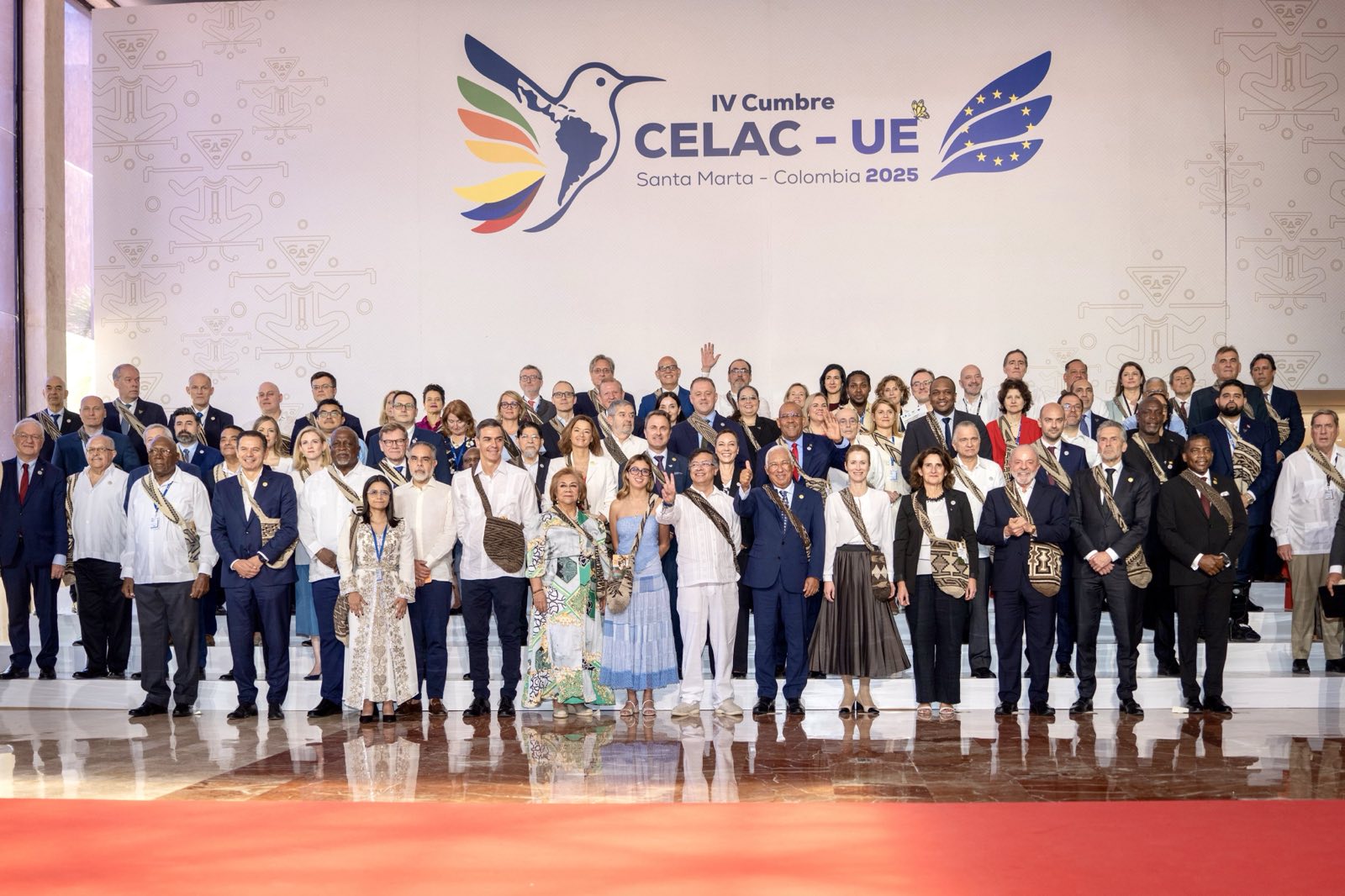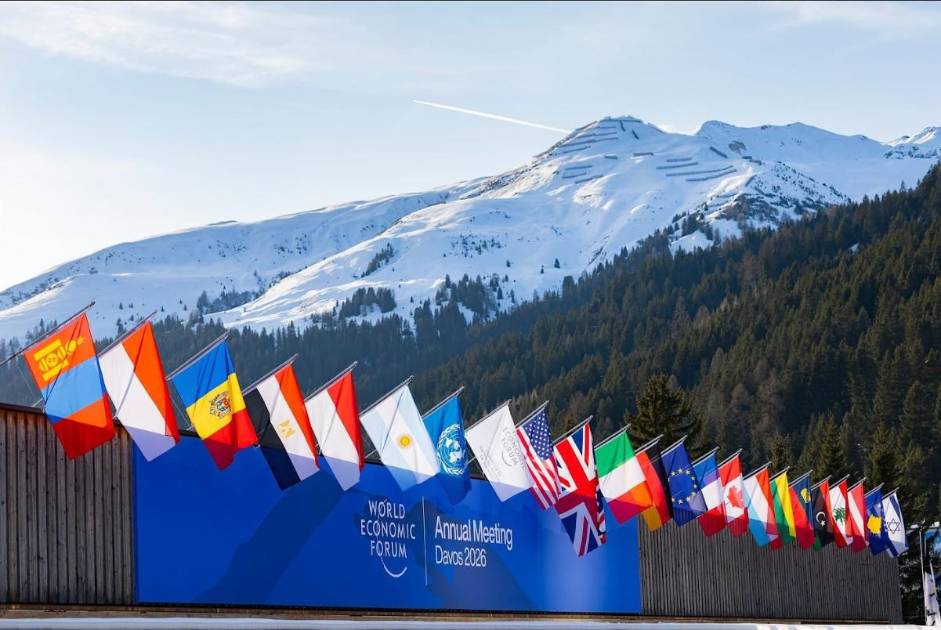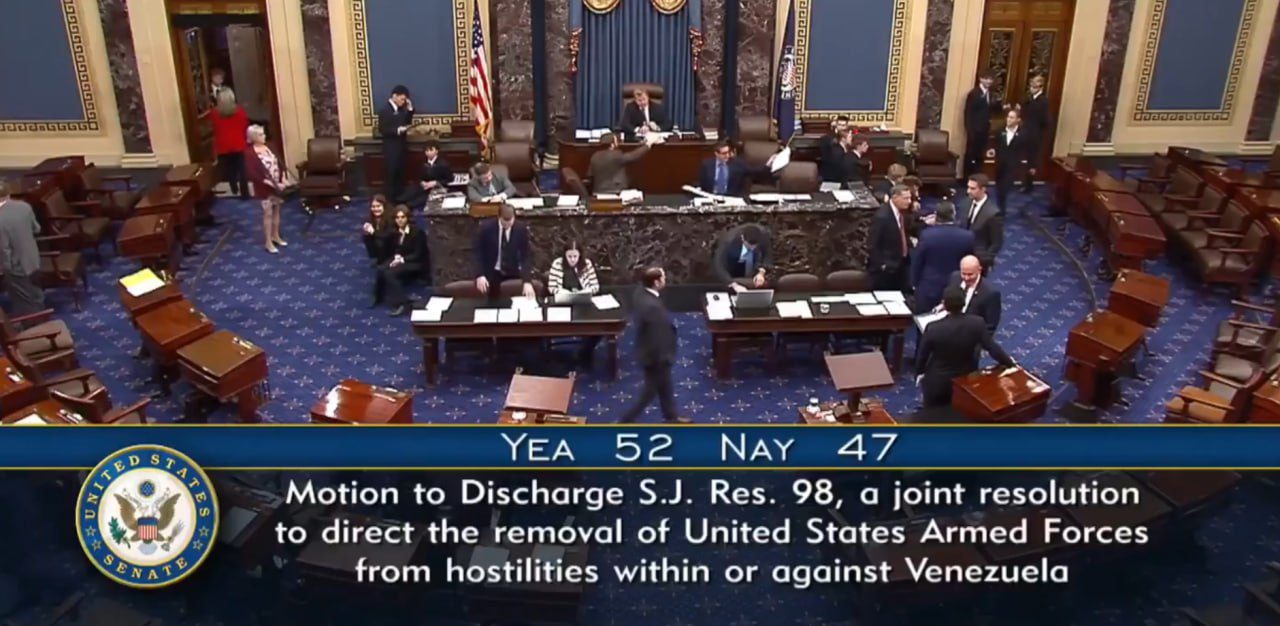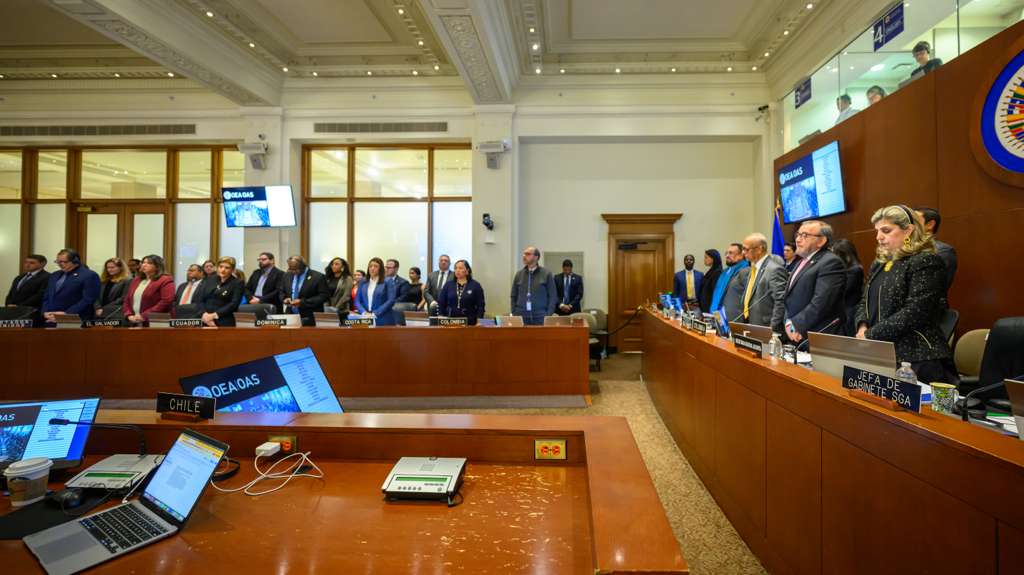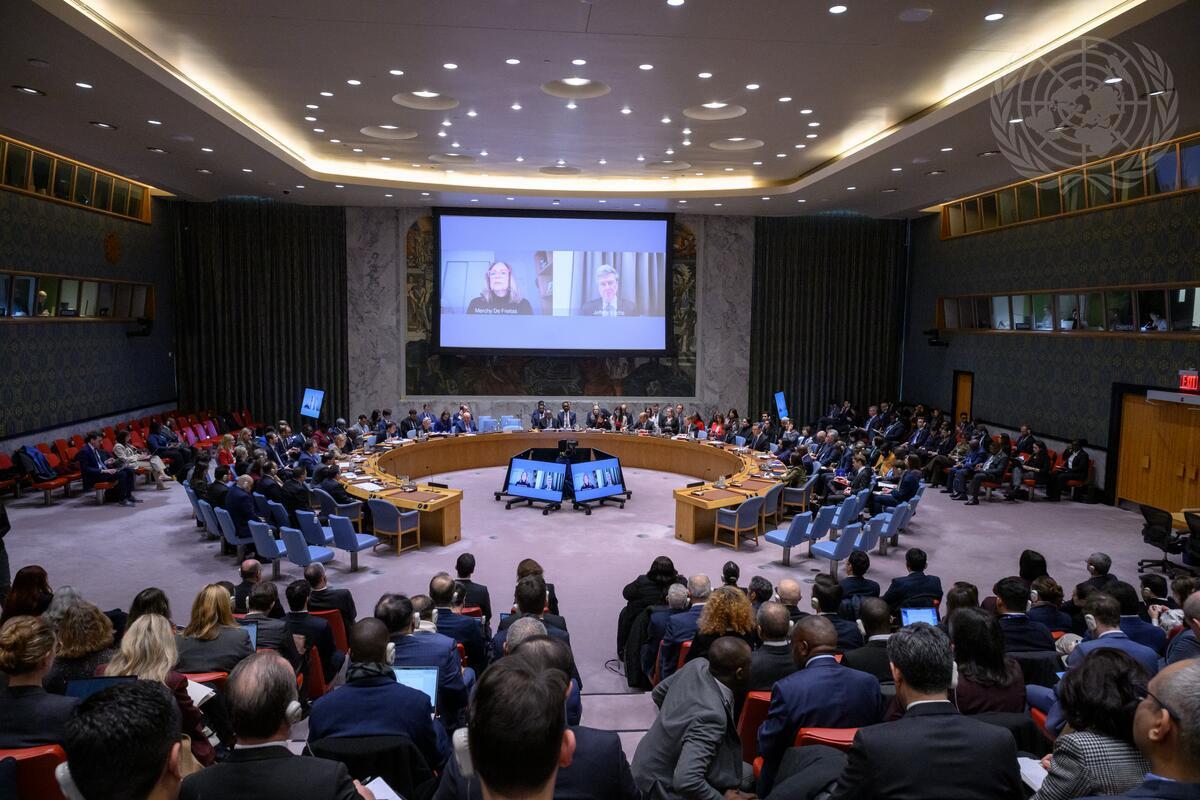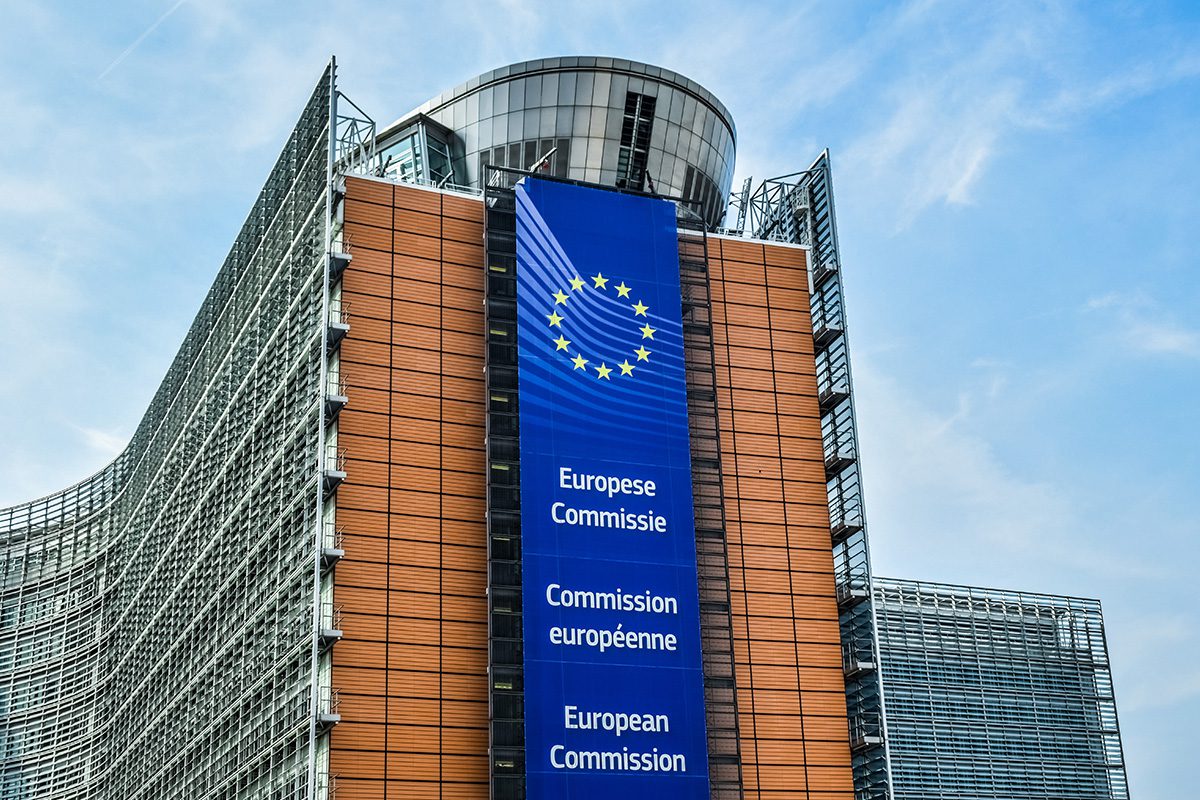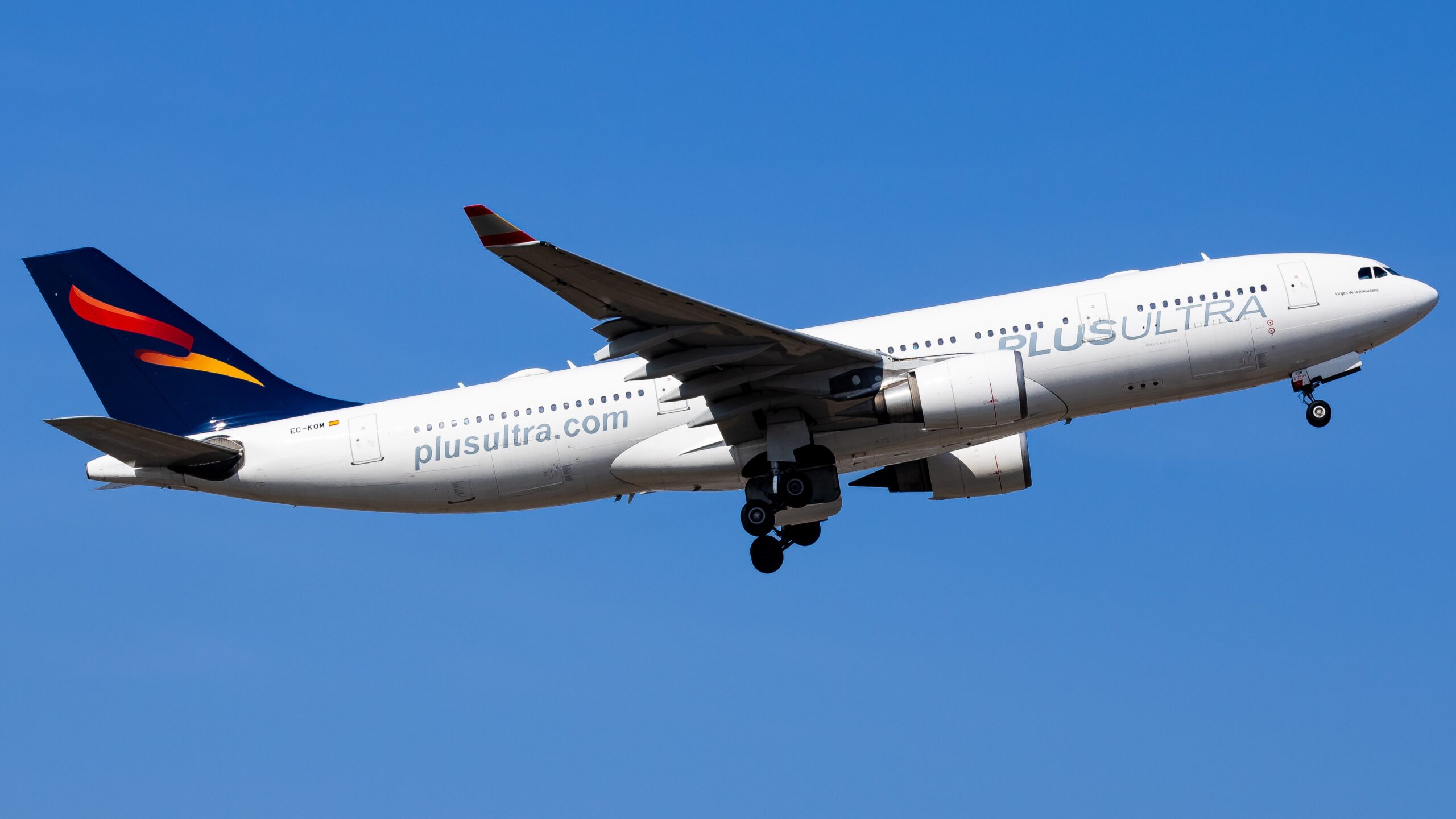Guacamaya, November 10, 2025. The Fourth Summit of the Community of Latin American and Caribbean States (CELAC) and the European Union (EU), held in Santa Marta, Colombia, ended early and with little participation from major leaders, reflecting the lack of political cohesion and the growing tensions in the Caribbean. The absences, the divergences over Venezuela, the wars in Ukraine and Gaza, and allegations of U.S. military deployments marked a meeting that aimed to strengthen bi-regional ties but ultimately exposed the diplomatic fragmentation on both sides of the Atlantic.
A meeting marked by absences and lack of interest
The bi-regional gathering, characterized by notable absences and last-minute cancellations of European and Latin American leaders, generated little interest among the heads of state from both regions.
Representatives from European and Latin American countries arrived in the Caribbean city of Santa Marta to discuss issues such as trade, energy transition, and cooperation against organized crime.
Colombian President Gustavo Petro denounced, days before the summit, alleged U.S. pressure against attending the event. Europe and Latin America, he said, should act as “a unified beacon capable of standing up to any barbarity, denouncing it, and working to correct it.”
The meeting was co-chaired by Petro and the President of the European Council, António Costa, with the participation of Spanish Prime Minister Pedro Sánchez, Portuguese Prime Minister Luís Montenegro, and Dutch Prime Minister Dick Schoof.
One of the most notable absences was Ursula von der Leyen, which reinforced the perception of a summit with fragmented leadership. French President Emmanuel Macron also did not attend, as he traveled to Mexico to meet with Claudia Sheinbaum. Likewise, the prime ministers of Finland, Barbados, and Belize were absent.
Uruguayan President Yamandú Orsi did not attend and was represented by his foreign minister, Mario Lubetkin. On the European side, Croatian Prime Minister Andrej Plenković was replaced by Environment Minister Marija Vučković.
The few heads of state and government present posed for a family photo holding an arhuaca bag, traditional to the Indigenous peoples of Santa Marta, before heading into closed-door meetings.
The caribbean and Venezuela: At the center of tensions
At the summit, the Caribbean and Venezuela occupied a central place in discussions about energy, migration, and climate change. The Caribbean region sought to reaffirm its role as a political and diplomatic bridge between Europe and Latin America, emphasizing the need for more equitable cooperation in facing global challenges.
Colombian President Gustavo Petro, the summit’s host, made clear that the meeting would not only focus on intercontinental cooperation, green energy, and sustainable digital development.
“The same missiles that fall in Gaza fall here, in the Caribbean, on poor people,” Petro declared, stating that one of those killed in the U.S. operations was a fisherman from Santa Marta. “In light of international treaties, in light of democracy and freedom in the world, this was simply an assassination — an extrajudicial execution,” he denounced.
Petro urged that the summit serve as “a beacon of light in a world where barbarism is advancing.”
On Tuesday, Brazilian President Luiz Inácio Lula da Silva said he would address the issues of Venezuela and the increased U.S. military presence in Latin America.
“Venezuela faces a political problem that must be solved through political means,” Lula stated, adding that he had told Donald Trump that “Latin America is a region of peace, not of war.”
A brazilian government source told El País:
“By traveling to Santa Marta, Lula sent a clear message — to show that there is a situation in the South Caribbean and that we are not interested in any military solution on the northern coast of South America, especially in countries bordering Brazil, such as Colombia and Venezuela. We do not recognize the elections in Venezuela, nor do we support what is happening there, but we are even less interested in a military problem along our Amazonian northern border.”
“We share the same values; we believe in the rule of law and democracy,” reiterated Kaja Kallas, Vice President of the European Commission, upon her arrival. She added, “The use of force can only be justified for two reasons — in self-defense or under a resolution of the UN Security Council,” in reference to recent U.S. attacks on alleged drug traffickers in the Caribbean — a message that resonated deeply in a region sensitive to foreign interventions.
Kallas attended the summit representing the European bloc after Ursula von der Leyen’s last-minute cancellation — a fact that did not go unnoticed among Latin American diplomats. Her presence reaffirmed Europe’s interest in maintaining an active dialogue with Latin America, even amid global tensions and diverging agendas between Brussels, Washington, and several governments in the region.
Spanish Prime Minister Pedro Sánchez also condemned the attacks, calling for strict adherence to international law.
Meanwhile, Nicolás Maduro sent a message to those attending the summit:
“From this Santa Marta that witnessed the last days of the Liberator Simón Bolívar, I speak to you with the voice of the Venezuelan people and with the memory of our history as our commitment and guide… Santa Marta remembers the wound that shattered Gran Colombia; it remembers the betrayal of division that for a time extinguished the dream of a great homeland… Bolívar taught us that ‘we are neither Europeans nor Indians, but a mixed species between the rightful owners of the land and the Spanish usurpers’; that mestizo, creative, and sovereign condition is the foundation of our identity and our demand for respect.”
Maduro warned:
“Today, two centuries later, the forms of siege have changed but not their essence. Naval and air formations are being deployed in the Caribbean, including next-generation aircraft carriers, missile destroyers, and nuclear submarines. These maneuvers and attacks have caused civilian deaths at sea and have been described by UN experts and the Office of the High Commissioner for Human Rights as ‘executions.’”
He called for multilateralism:
“Our CELAC, born in Caracas in December 2011, was created as an alternative to the logic of tutelage and pressure. As President Hugo Chávez declared, ‘only unity will make us free.’”
And demanded an end to the attacks:
“Faced with the military threat in the Caribbean and the executions denounced by the UN, we must unite our forces as nations and demand the immediate cessation of military aggression and threats against our peoples.”
Maduro was represented at the summit by his foreign minister, Yván Gil, who urged member states to adopt a firm stance against the U.S. military buildup in the Caribbean Sea.
Gil stated that the presence of warships and nuclear submarines “constitutes a direct threat against Venezuela and peace in the hemisphere,” violating the 2014 CELAC Declaration of the Zone of Peace and the Treaty of Tlatelolco, which prohibits nuclear weapons in Latin America.
“The pretext of fighting drug trafficking cannot justify actions that threaten regional stability,” he emphasized.
An interesting point is that at the previous summit, held in Brussels in 2023, Venezuela was represented by Delcy Rodríguez, Vice President and Minister of Petroleum. This marks a difference, since Rodríguez usually heads Venezuela’s delegations to high-profile international forums. On this occasion, however, representation fell solely on the foreign minister — despite the event taking place in neighboring Colombia — which may indicate an adjustment in Caracas’ diplomatic strategy or a prioritization of other multilateral arenas, particularly those linked to China and Russia, with whom ties have intensified in recent months. U.S. media have even suggested that Maduro has requested military assistance and equipment from both countries amid the escalation with Washington.
Opposition leader Henrique Capriles Radonski also issued a statement to summit leaders, declaring:
“The crisis we Venezuelans face is not ideological; it is an economic and social collapse resulting from years of a so-called ‘revolution’ that destroyed our economy (we lost 75% of our GDP) and created the highest poverty rates in our history, triggering the largest migration ever seen in the continent.”
He added:
“Our nation needs democracy, stability, strong institutions, and respect for the popular will to be an active part of genuine regional integration. The majority of Venezuelans reject those in power today, yet we do not support violent solutions or foreign interventions that would only worsen the crisis. We need peaceful, democratic solutions rooted in real dialogue and respect for the Constitution and international treaties.”
This statement distanced Capriles from the opposition faction led by María Corina Machado, which has supported U.S. military actions in the Caribbean and sanctions against Venezuela’s economy.
The “Santa Marta Declaration” and the disagreements
The IV CELAC–EU Summit adopted the “Santa Marta Declaration,” a 52-point document in which both blocs reaffirmed their commitment to international law, multilateralism, and the peaceful settlement of disputes.
However, Venezuela and Nicaragua disassociated themselves from the text, while Argentina, Ecuador, and Paraguay withdrew from the paragraphs concerning Gaza.
The document expressed “deep concern over the war in Ukraine” and supported efforts toward a “sustainable ceasefire.” It also “unequivocally condemned” the October 7, 2023, Hamas attacks and the “escalation of violence in the occupied West Bank, including East Jerusalem.”
The summit also addressed the crisis in Haiti, pledging to support the country’s political and economic stability and to combat arms trafficking while respecting national sovereignty.
Trade, investments, and an early end
Despite tensions, the summit highlighted the growth of bi-regional trade: a 52% increase in goods and nearly double in services over the past decade.
The EU–LAC Global Gateway Investment Agenda, created in 2021, was reaffirmed, focusing on green transition, digital transformation, human development, and health resilience. A Bi-Regional Care Pact was also launched to strengthen care economy policies.
However, the summit ended early on Sunday, November 9, despite being scheduled through Monday.
Diplomatic crisis between the U.S. and Colombia
The summit’s context was overshadowed by renewed friction between Bogotá and Washington.
Following revelations in Revista Cambio about an alleged plan by a Republican senator to have President Petro imprisoned, the Colombian leader denounced U.S. pressure to undermine the summit.
Although Bogotá initially recalled its ambassador to Washington, it later softened its stance.
“There will only be a verbal note; the ambassador will not be expelled,” said Foreign Minister Rosa Villavicencio.
Interior Minister Armando Benedetti confirmed that U.S. Ambassador John McNamara would not be expelled, though rumors persisted.
A directionless encounter
European Council President António Costa tried to close on an optimistic note:
“This multipolar world of ours requires a multilateral response to the challenges we face. The EU–CELAC Summit in Santa Marta demonstrates the value of dialogue and will allow us to make our natural bond even stronger — to grow together and protect one another.”
Nevertheless, the IV CELAC–EU Summit in Santa Marta will be remembered as a failed attempt to revive the bi-regional dialogue — overshadowed by diplomatic fragmentation, tensions in the Caribbean, and the growing shadow of global conflicts over Latin America.

